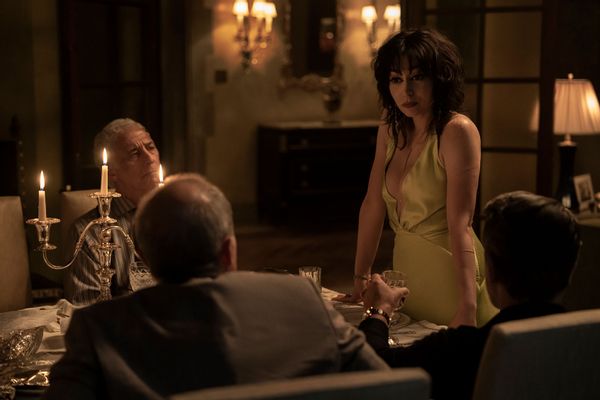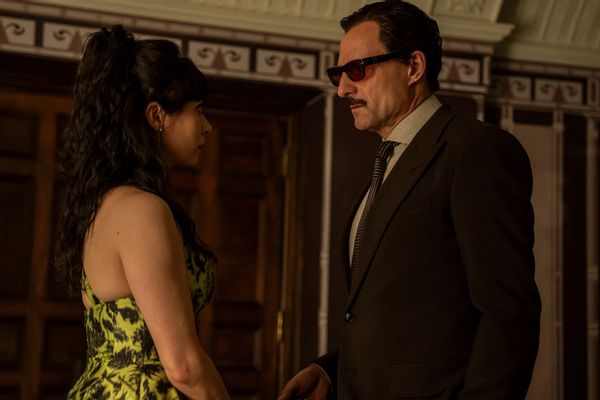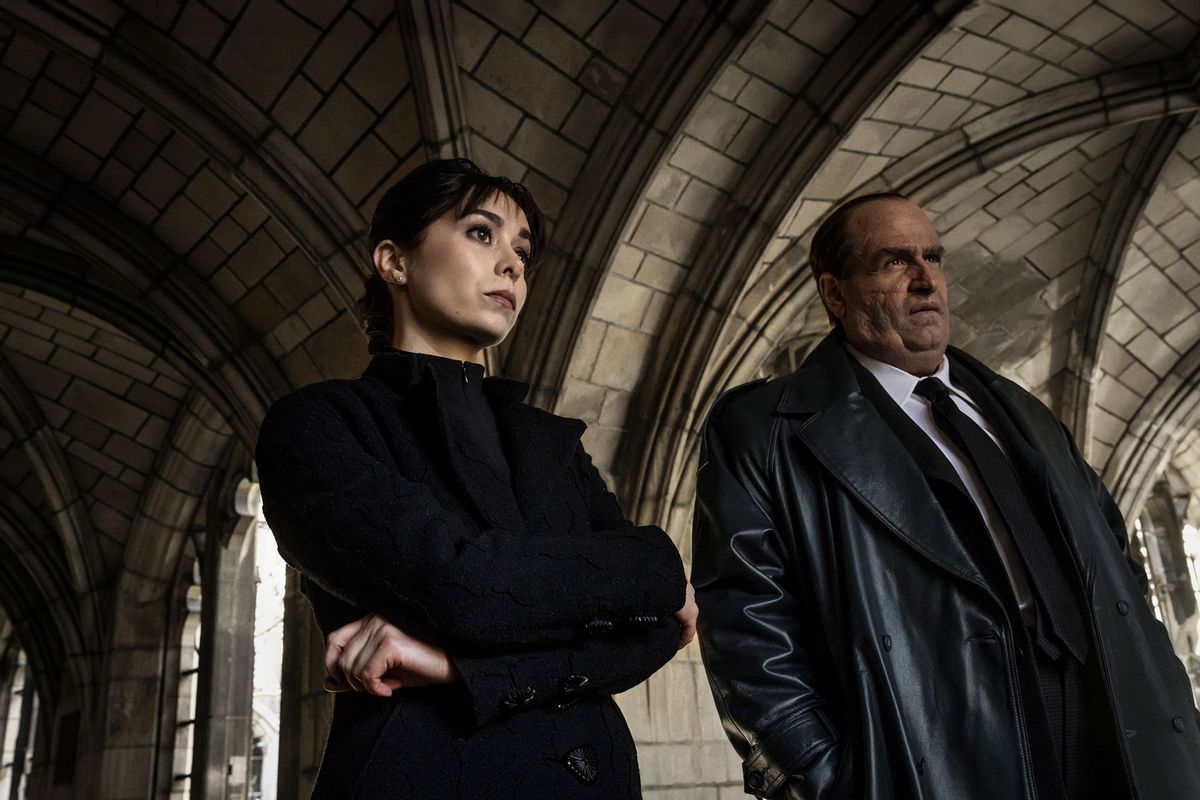Gauging Sofia Falcone’s situational anger at any moment in “The Penguin” isn’t tough. Just look at her eyes — not simply the emotions flickering across them, but how she paints them. When Sofia (Cristin Milioti) is first introduced, her makeup is barely visible, and demure, as one would expect of a proper Gotham heiress.
Her graceful subtle clothing, we assume, comes from the closet she was forced to leave behind before her decade-long stint in Arkham Asylum, and from an era when she was still Daddy’s Favorite. Ivanka Trump to Carmine Falcone’s Donald. Pre-Arkham Sofia twinkles brightly, knowing her father intends for her to take over the family business.
Then she makes the fatal mistake of figuring out Carmine murdered a string of women, including her mother Isabella, and badda-bing-badda-boom — Daddy pins his homicides on his little girl, allows the local media to brand her as The Hangman and locks her away with Gotham City’s worst.
Ten years later, after Carmine (Mark Strong) and her brother Alberto (Michael Zegen) are dead, Sofia returns home to find her uncles seizing her birthright. That’s when her portentous warpaint emerges, a crisp black border drawn from tear duct to wing crowning a frigid, distrustful gaze.
Those who know fashion recognize this as the cat's eye. Those who know history may see shades of Hatshepsut, the woman pharaoh, in that look. Either way, at the peak of the pivotal episode titled “Cent’anni,” it announces she has no intention of silently accepting her reputational stains.
At a dinner celebrating her Uncle Luca’s improper ascension, she strides into the room, seats herself at the other end of the table, and interrupts his self-aggrandizing speech to address the family members who aided her father’s calumny.
“I was genuinely surprised to see how many of you wrote letters to the judges, telling him I was mentally ill. Like my mother,” she said. “. . . I trusted you. I loved you. And yet none of you tried to help me.” Admitting that she understands she no longer fits into the family anymore, she announces that the next day she’s starting a new life and offers a non-specific toast to new beginnings.
 Cristin Milioti in "The Penguin" (Macall Polay/HBO)Hours later, Sofia wipes out all but two people at that table. Not long after that, she announces to the remaining muscle that she and the family have a new name: Gigante. Her mother’s.
Cristin Milioti in "The Penguin" (Macall Polay/HBO)Hours later, Sofia wipes out all but two people at that table. Not long after that, she announces to the remaining muscle that she and the family have a new name: Gigante. Her mother’s.
Sofia Falcone was introduced in 1997 in Tim Sale’s “Batman: The Long Halloween,” the text that explains the fall of the Falcone criminal dynasty, the same ground “The Penguin” covers. Her trajectory in those comic books influences her history in “The Penguin,” with one of the main departures being her appearance.
Sale drew her as unattractive and jagged. The 2021 animated movie adaptation makes her more glamorous, but she’s still a zaftig giantess too heavy for Catwoman to hang onto as she’s dangling off the side of a building.
“Gotham” introduced a sexier version of the character who, for a while, had a fling with James Gordon. Ergo, against this history Milioti’s physical attributes are entirely pertinent to how we perceive Sofia. The actor’s physique is one easily mistaken for the kind a ruthless heavy could break like a twig or silence by barking some reminder to know her place. The knives in her stare let them see the danger in that cocky misperception.
No matter what Sofia does or doesn’t do, her patriarchal criminal family refuses to afford her the respect she’s due.
Milioti’s eyes often figure into critical appraisals of her work, which can’t be helped when evaluating someone with such a prominent and expressive feature.
But it’s the way she employs her gaze in that Last Supper monologue and every moment of “The Penguin” that captures the extraordinariness of a little-known character in the “Batman” universe.
Sofia does not weep. Her eyes redden and her voice breaks with fury she’s earned, but she knows that even before an audience of the condemned, people who readily dismiss her as unhinged and unstable, she cannot appear to be anything less than solid in her resolve.
In a tense second episode scene, the family’s goons refuse to hand her a gun when she demands it to execute one of the men she thinks has betrayed her. No matter what Sofia does or doesn’t do, her patriarchal criminal family refuses to afford her the respect she’s due – even when she has one, her uncle Johnny Viti (Michael Kelly), chained up for torture.
Not long before that, Johnny threatens to do in his niece if she doesn’t disappear to Italy. After Sofia’s pulled a Frey mass murder leaving him alone and chained up in his underwear, negotiating for his life, he tries to shame her by saying, “What kind of person kills their own family?”
You get the logic: Sofia, you see, doesn’t have the right to kill him – but he can kill her. She isn’t an equal in blood or status until it matters to the man trying to save his skin.
“Daddy is dead,” she tells Oz Cobb over dirty martinis in the first episode, “and we are untamed.”
We need your help to stay independent
“The Penguin” is a window into a dark universe that, in the way of all “Batman” titles, bears plenty of resemblance to the nightmare version of our own. Its Gotham as a right-wing talking point come to life, hollowed out by federal disinvestment and abandoned to the whims of street gangs, mobsters and the benevolent grace of a gazillionaire industrialist named Bruce Wayne.
The endless malleability of this part of the DC Comic universe is related to knowing that its hero and most of its core rogues’ gallery, even at their most fantastical, are subject to the laws of physics, including socioeconomic gravity.
With “The Penguin,” an outgrowth of Matt Reeves’ vision in 2022 for “The Batman,” series creator Lauren LeFranc overhauls what we know of the villain.
 Cristin Milioti and Mark Strong in "The Penguin" (Macall Polay/HBO)Gone is Burgess Meredith’s pointy-nosed homage to Mr. Monopoly, with his top hat, tuxedo and monocle, replaced by Oz Cobb (Colin Farrell, entirely vanished under a mountain of naturalistic prosthetics), a sweaty street-level striver reminiscent of Tony Soprano, with a similarly unhealthy relationship with his mother, Deirdre O'Connell’s Francis Cobb.
Cristin Milioti and Mark Strong in "The Penguin" (Macall Polay/HBO)Gone is Burgess Meredith’s pointy-nosed homage to Mr. Monopoly, with his top hat, tuxedo and monocle, replaced by Oz Cobb (Colin Farrell, entirely vanished under a mountain of naturalistic prosthetics), a sweaty street-level striver reminiscent of Tony Soprano, with a similarly unhealthy relationship with his mother, Deirdre O'Connell’s Francis Cobb.
Bob Kane’s comics styled The Penguin, aka Oswald Cobblepot, as Bruce Wayne in negative – rich, but self-serving and eager to profit off the people’s pain instead of championing them. Where Wayne’s Batman is lithe and graceful, The Penguin is awkward and rotund; while Wayne is charismatic, the Penguin is a weirdo, a quack.
With Sofia, though, LeFranc demonstrates an understanding of an underlying frustration with how these stories depict female characters and a misogynistic culture's shrunken regard for female power.
We love a villain like Sofia in theory because her outrageous impulses are the realization of every frustrated, angry and entirely sane woman’s darkest thoughts.
Any delight or inspiration Milioti’s gangland empress makes us feel is a natural response to our fatigue at this point in a campaign cycle leading up to an election that will double as a referendum on gender. Less than two weeks from now, we will find out whether Americans are more wedded to their internalized sexism than their democratic principles.
We can sense where this is all headed, and so do "The Penguin" writers, because it's an old, old story: One of the show’s cleverest nods in direction is in a scene where Oz and his boy wonder Vic (Rhenzy Feliz) watch “Gilda” at his mom’s place and contemplate Rita Hayworth’s steamy rendition of “Put the Blame on Mame.”
“Who’s Mame?” Vic asks. “Don’t matter, kid,” Oz tells him. “That’s the thing. She’s just a scapegoat.”
Want a daily wrap-up of all the news and commentary Salon has to offer? Subscribe to our morning newsletter, Crash Course.
We love a villain like Sofia in theory because her outrageous impulses are the realization of every frustrated, angry and entirely sane woman’s darkest thoughts. She is not overly emotional or crazy; ironically, Arkham Asylum bled those perceived frailties out of her. Sofia is more capable than any of her family’s capos, something they’ll never accept because she doesn’t have a penis. Unlike her irresponsible and erratic-tempered brother, she’s calculating and stoic and knows that regardless of how she dresses or speaks or what she does, she’ll never be rid of that Hangman notoriety.
When Sofia takes her new name, she stands at the head of the table, announces she’s wiped out her family, shoots the last made man in the head when he tries to order her to settle down, and dumps a bag of cash on the table for the mafia’s pawns. Her eyeliner, by the way, has moved to her lower lid to outline her soul’s darkness. That's called the reverse cat’s eye . . . which may be coincidental, who can say?
Every major “Batman” villainess (or anti-heroine, in Catwoman’s case) exists in relationship to men or a specific man. Catwoman and Poison Ivy are held in high esteem because they’re seductresses. Harley Quinn, before her great emancipation, was the ultimate gangster moll existing at and for the pleasure of The Joker.
Sofia, though, isn’t a diminutive girl or Carmela Soprano. She’s a force propelled by her own will, Arya Stark with Joan Jett’s haircut, a girl who takes her mother’s name and dresses in her armor. “The Penguin” may in name be concerned with the fall of Gotham’s organized crime underworld and Oz Cobb’s rise from a nobody to an immortal antagonist, but it’ll be a long time before Sofia Gigante's legend diminishes in our memory.
New episodes of "The Penguin" stream at 9 p.m. Sundays on HBO Max.



Shares